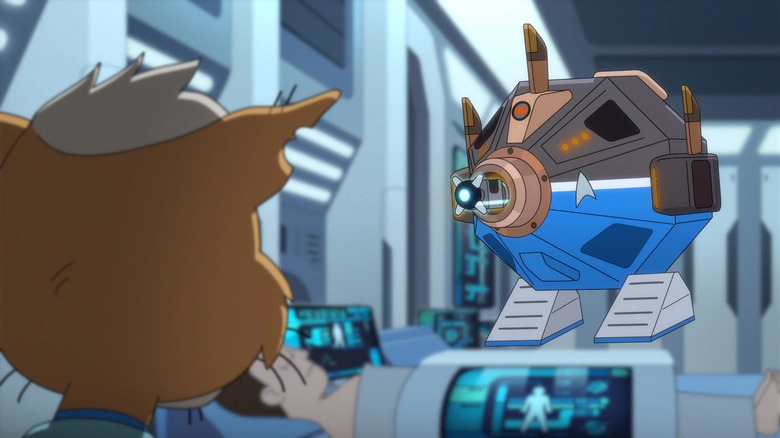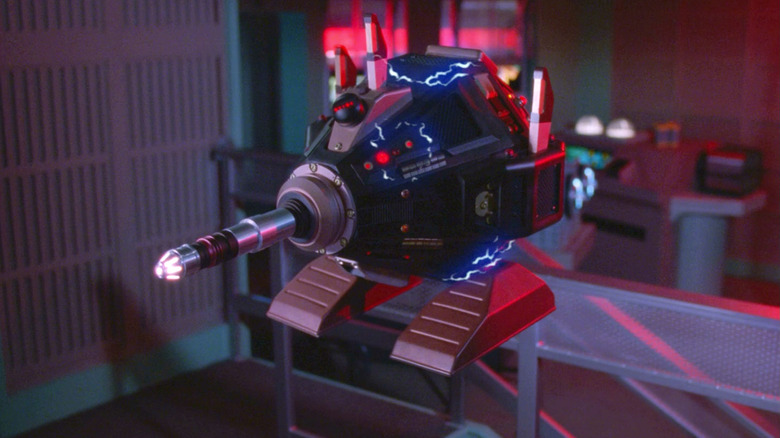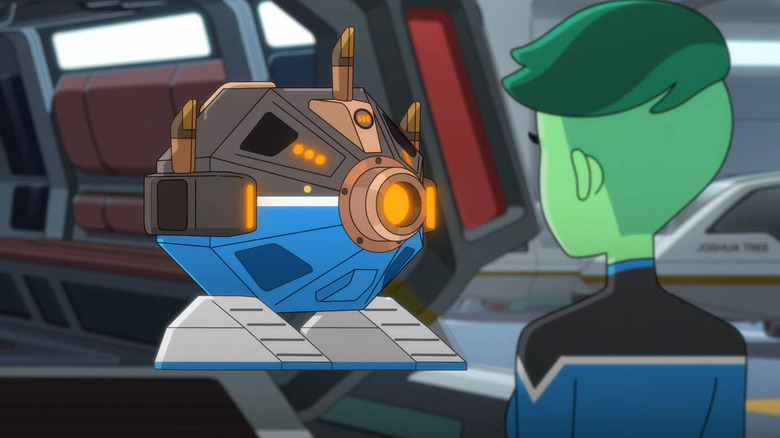A Short History Of Exocomps In The Star Trek Universe
This post contains spoilers for the latest episode of "Star Trek: Lower Decks."
The latest episode of "Star Trek: Lower Decks," called "A Mathematically Perfect Redemption" is a change of pace for the series. The episode takes place almost entirely away from any of the show's regular characters, catching up instead with Ensign Peanut Hamper (Kether Donohue), last seen in the episode "No Small Parts." Peanut Hamper was initally presented as a capable, if nervous, rookie officer eager to get to work on a Starfleet vessel. By the climax of "No Small Parts," the U.S.S. Cerritos finds itself on the receiving end of a weapons barrage from an enemy ship. During the attack, Peanut Hamper finds herself specially equipped to deliver a computer virus to their attackers, shutting them down and saving the ship. In a moment of truth, however, Peanut Hamper admits that she joined Starfleet as a way to anger her father, is certainly not going to take on a dangerous mission, and beams herself into deep space, abandoning her compatriots. She was, as far as the audience knew, left alone and adrift.
"A Mathematically Perfect Redemption" picks up with Peanut Hamper adrift, attempting to save her own life with hastily salvaged engine parts also floating through space. She is embittered and made selfish by her experience. She eventually crash lands on a planet of primitive humanoid bird aliens and seemingly rediscovers her devotion to Starfleet principles by understanding an alien species for the first time.
Oh yes, and Peanut Hamper is an exocomp. She's about a half meter high, one meter long, has no face, and floats around on two adorable robot feet. Her front nozzle is equipped with a tool replicator, allowing her to manifest any object she may need in the line of duty. She is not terribly different from R2-D2.
Exocomps
Exocomps made their first appearance in the "Star Trek: The Next Generation" episode "The Quality of Life" (November 16, 1992). The robots were initially designed to be service bots intended to be sent into narrow or dangerous areas to make repairs. The exocomps were invented by an engineer named Dr. Farallon (Ellen Bry) and were infused with a rudimentary artificial intelligence that allowed them to assess complex problems and replicate the tools they needed.
Unwittingly, however, Dr. Farallon seems to have given them more agency than she intended, and the exocomps begin exhibiting signs of decision-making and self-preservation. For the android Data (Brent Spiner), these are inarguable signs of life. This leads to a tense scene where Data prevents the exocomps — for ethical reasons — from being sent into a highly irradiated area to save Captain Picard (Patrick Stewart) and Lt. Commander Geordi La Forge (LeVar Burton). Data argues that the exocomps need to choose to go on a dangerous mission for themselves.
In "The Quality of Life," luckily for Picard and La Forge, the exocomps do indeed choose the dangerous mission, although the robots are clever enough to complete the mission with only one exocomp casualty. The episode ends with Dr. Farallon, still somewhat doubting the sentience of her invention, pledging at least to treat the exocomps humanely. For Data, an artificial life form was born that day, and one that could elect to behave heroically. Not only could the exocomps display signs of self-preservation, but they understood the value of the lives of others. The robots were, at last measure, brave and well-reasoned, even if they had no language and no way of communicating directly with humanoids.
Peanut Hamper
"The Quality of Life," on the "Star Trek" timeline, takes place in about the year 2369. "No Small Parts" took place in about 2381. In those 12 years, exocomps, it seems, have continued to evolve. They not only developed a definite consciousness, but can now speak out loud and even express a full gamut of emotions. They are even, it seems, ambitious enough to want to join Starfleet, and Peanut Hamper shows up on the U.S.S. Cerritos in uniform, ready for her first tour of duty. Ensign Tendi (Noël Wells) is eager to show her around.
The character, it should be noted, named herself. Rifling through the vastness of the English language, Peanut Hamper's robot brain approximated the two most beautiful words she could find. Because they are open-minded and professional, none of the Starfleet officers question her name choice.
The joke of Peanut Hamper, as set up in "No Small Parts" and explicitly and extensively elucidated in "A Mathematically Perfect Redemption," is that exocomps aren't all heroes. In fact, this one is a bitter, selfish coward. She manipulates people, is annoyed by the whims of others, and begins to adopt something of a sociopathic streak. This plays itself out in the episode's epilogue. After being recovered by Starfleet, the true depths of Peanut Hamper's plan are laid out in detail, and her true depravity revealed. Peanut Hamper is placed in a special prison for malevolent machine intelligences. Evidently, this is a big problem in the world of "Star Trek."
In a world where the Enterprise can accidentally create a sentient hologram of Moriarity, it's surprising there hasn't been some kind of machine uprising. Perhaps that is to come.


